- Home
- Tony Roberts
The Commissar Page 2
The Commissar Read online
Page 2
“After all, comrades,” Casca had smiled chillingly, “you are no longer soldiers and so what are you doing here, if you are keen to return home? Go home and feed your families with the money you’re not getting from being soldiers.”
He had sensed the fury from the group. He had left them with a final warning that he would happily kill them if they came looking for him.
They were typical of the less-disciplined elements in every unit of the Russian army. There was still a fighting spirit there but it was wilting.
So he had his rifle and his uniform
Their place along the line was close to the Bukovinan town of Stanislau, which was the major town in the region and served as the main supply center for them. Their division, the 11th, was sited to the south of this and was to advance against an opponent in an exposed position, the Austrian 15th division. Feelings amongst the men was that they could prevail against an army as equally weak as theirs, so they were at least hopeful of victory. If the Germans had been facing them, it was doubtful there would be half the men here willing to advance.
The terrain was a series of ridges and valleys with streams or watercourses running along the bottom. Casca had studied the terrain enough over the past few weeks to know it would be a bitch to push forward with, but there again, the Austrians would have difficulties in bringing up reinforcements and supplies. They seemed as incompetent as the Russians.
Ahead, as he looked out through the gaps in the barbed wire that had been made to allow for the attack, he saw the low gentle rises in the distance, their objective. Nobody had told them, of course, all they said was that they were to attack the Austrian trenches ahead of them and capture them. Casca wasn’t a dumb illiterate though, and he’d gotten hold of a map and reckoned their objective was the Austrian supply town of Kalusz.
Further orders would be coming should they take the trenches. The artillery bombardment had been going on for a day, smashing down on the enemy positions. The guns were just about the best arm of the Russian army, and some infantrymen had been known to turn on the gunners if they had been doing too good a job. They resented someone showing too much enthusiasm for a war they no longer wanted to be part of.
Officers were in despair; some were threatened, some had even been murdered. A few units remained together but Casca guessed this attack would whittle away many who still believed in the war. This attack would only play into the hands of the Communists and anarchists, and Kerensky and his provisional government would find they had made a huge mistake. As always, it was the army who decided whether a government or leader remained in power. It had ever been so, and Casca remembered Commodus, the emperor, buying the loyalty of the army by throwing them money from the treasury when they had been marching to depose him. It had kept him in power for a while longer. Too long. He’d been a bad leader and had exhausted the treasury. He’d been done in, eventually, by the army, and then had come the auctioning of the throne, candidates not asking for votes, but for the army to back them, offering them money they didn’t have.
Casca spat into the soil ahead of him. Foolish people, wanting power. It only led to more problems. As to these Communists and Bolsheviks, it remained to be seen what they would do. They were not drawn from the upper classes, the aristocrats, and that was probably a good thing. That crowd had been as corrupt and self-seeking as any group of people he’d seen in his time and it was a good thing they had been swept away, but what now for the peasants? Starvation, for sure. The system had collapsed and nothing was moving.
Now the order to attack came. With a deep breath, Casca stuck his foot in the trench wall where a step was, and heaved himself up and over, crouching low, and instinctively beginning to zig-zag.
CHAPTER TWO
Bullets. He expected it. The mass of brown to left and right struggled on, across ground that had been blown up into a nightmarish mass of loose soil, craters and broken trees. Water filled the bottoms of the holes in the ground, even though it was summer, for they were never very far from the water table. Winter here was not for the faint-hearted.
He scrambled on his knees over the edge of a crater and rolled down to the bottom, getting covered in mud. He slid up to the edge and peered over. As usual, machine-guns had avoided being damaged by the artillery, but there wasn’t a lot of fire coming their way. Men were falling, yes, and screaming in pain, but it wasn’t as bad as the Western Front or what he’d witnessed in the Transylvanian Alps.
He got up, cursing the generals, politicians, newspapers, Maxim, Vickers and all the other arms manufacturers. Why invent the fucking gun? Why not leave it to the good old sword? It was much more structured and easy then.
Bullets swept towards him from the right and he readied to throw himself to the ground, but then they stopped. Jammed! He whooped and ran hard for the visible trench, a vague term, as it was partially destroyed to the left. Three Austrians were working hard to free their weapon, and saw eight Russians running at them, murder in their eyes, led by a large man with a scar.
The Austrians turned and fled, leaving their jammed gun to be taken by the jubilant men with Casca. “We can use this on the enemy!” one declared.
“If you can un-jam it, you whoreson.”
“See if you can,” Casca snapped. “Then use it on their second trench. We stay here.”
The others all nodded in agreement. “Sensible idea, comrade. We hold this section of trench!”
Casca peered over the loose edge of the poorly-dug trench and examined the next line of Austrians. They were shooting haphazardly and not that effectively. He was used to facing much better soldiers. If the Russian army had been in some kind of order and not undermined by the Bolsheviks and poor leadership, then it was certain they would have swept this series of trenches without trouble. The British or the Anzacs would in no time.
He wondered where Lukin was. He had been a couple of soldiers to the right, but he hadn’t seen him since going over the top. Lukin hadn’t been enthusiastic and had been talking about faking a wound or injury, and Casca had tried to talk him out of it. He wondered if the Russian had actually followed the attack, or slunk off. Now there was no punishment for refusing orders, it wouldn’t be beyond the realms of possibility.
The machine-gun was freed. The Russians with Casca excitedly placed the gun on the parapet and in a disorganized bunch got the belt fitted and one of them, the one with the loudest mouth, began shooting. Casca put a hand to his eyes and watched as the majority of the bullets flew high over the head of the Austrian trench. “Aim lower, you idiot!” Casca snapped.
“Who are you to tell me, comrade?” the man responded.
“You’re more of a danger to the stars than the enemy.”
“It won’t depress any lower!”
“Then move the position of the gun so it does!” Casca rolled his eyes. Peasant fool. He muttered “whoreson” so get into the flavor of the situation.
“You’re not an officer, so you cannot order me.”
“If I were, you’d still not listen. Did your mother drop you on your head at birth?” The others roared with merriment. This was better than risking their lives, hearing the two argue like this.
“Shut up. You were slapped by yours at birth for being so ugly. This gun does not want to shoot at its former owners, clearly!”
Casca slid down the parapet and walked over to the belligerent Russian. He pulled the man’s cap down over his eyes. “Now at least you can see better since you don’t know how to use your eyes properly. Whoreson!” He pushed the man away and pushed the gun further over the edge and then sighted on the line of Austrians shooting at them. Her pressed the lever and the gun bucked, blasting a hail of bullets along the ground, churning up the soil immediately in front of the trench and making the Austrians dive for cover. “There, Ivan Krasny,” he said, nodding at the Austrian line, “that’s how you do it.”
The other laughed. Krasny, the Russian word for ‘Terrible’, was a reference to the former tsar Ivan The Terrible
.
The man huffed, pointedly set his cap on correctly, then began shooting more accurately. This got the attack going once more in their section and they were joined by more soldiers, and more came up to left and right. The machine-gun ran out of bullets but by then the Austrians had melted away.
Casca and the others advanced to the second line and occupied it. They could go no further as the third trench was properly manned and organized and shooting effectively. The Russians refused to continue and Casca could see their point.
After a day of consolidating their tiny gain and the artillery once more laying down a barrage on the Austrian rear and the second set of trenches, which were on higher ground so they could command a better field of fire, another attack was made ready.
Casca was told that Lukin had been wounded and was now being taken away to the hospital in Stanislau. So he had self-inflicted a wound, or maybe he’d been hit for real. Either way, he was out of it. The order came and the brown-garbed Russians swarmed out of their trenches and holes and ran for the Austrian lines.
Rifles, machine-guns and small artillery pieces opened up on the waves of men stumbling through ripped-up pieces of land, great holes in the ground and shattered trees, bushes and fencing. The slope slowed the momentum and the undernourished Russians found it hard to make their way, but Casca kept on encouraging the ones around him.
The wire before the trenches had been ripped to shreds, and only here and there it remained intact or providing some kind of screen to the enemy. It wasn’t enough to hold back the determined attackers and Casca ran up to the lip of the trench, screaming wildly, jumping down while nearly taking a shot through the head. The bullet grazed his cheek and stung like hell.
He landed on both feet, knees bent, and swung around quickly. No time to mess about. The trench wasn’t that wide and he had to hold his rifle and bayonet close to his chest as he swung about. An Austrian in his light blue uniform was turning to face him so Casca rammed his bayonet into his chest and the enemy soldier sank to the ground, face twisted in agony.
More men were jumping into the trench and now the fighting became less 20th century and more 12th century. Casca was holding the equivalent of a pike. He needed a close-up weapon. He unhitched the bayonet and wielded it like a short sword. It was almost as long. Using his rifle in his left hand like a club, he flailed at an Austrian NCO who was thrusting forward with his rifle and bayonet.
The enemy point was knocked aside. Now he was inside his reach. Stab up into the throat. The Austrian sank to the ground, drowning in his own blood. Two men ahead grappling, a Russian with whitened knuckled hands closed around an Austrian throat. Pass them by. A shot. A Russian crashed to one side, a read stain spreading across his chest, then slid to the ground.
Casca stepped forward. The soldier was reloading. Rifle butt to the face. The Austrian hit the trench wall hard. Stab forward. Chest. Twist, pull. Austrian sliding onto his butt. Forward. Some Austrian beheaded a Russian with his shovel. Blood everywhere. The Austrian, out of his head on adrenaline, turned to face Casca. Mad eyes staring out of blood.
Swing. Casca ducked. Thrust up into the guts with the bayonet. Those eyes went even wider. Twist. Pull. Smell of opened out guts. Casca left him clutching his ruined belly and moved on.
Two men on the ground wrestling. Russian on top, winning the strangle fight. Legs flailing everywhere. Casca jumped over them and carried on. Curses in German, Croat, Russian and a host of other tongues. An Austrian thrust hard at him, bayonet pointing wickedly at his throat. Smashed aside with his rifle. Slash with bayonet. Austrian ducked out of the way.
Rifle butt strike on the right shoulder. Enemy soldier grunted. Push. The Austrian’s breath exploded out of his body as he struck the wooden boarding of a dugout behind him. Boot into the face as the soldier sank down. Blood smeared all over the face. He’d need serious dental work now if he lived.
The dugout was a yawning black hole and Casca ducked his head and entered. A single carved out chamber in the earth, boarded walls and floors, at least in the center. Two small wooden tables, three chairs and a rudimentary bed and blankets to the left set in a wall alcove. On the further table was a radio and wires trailed from it across the floor to the wall behind it and then up through a hole in the ceiling.
Communications center. A man was frantically shouting into a microphone that the Russians were overwhelming them. He sensed Casca’s presence and grabbed a pistol and swung around. The eternal mercenary threw himself sideways and the bullet intended for him struck another Russian coming in behind him. Three more shots that struck the wall and planking, before Casca worked a chamber in the breech and got on his knees and blasted the operator to hell.
The smell of discharged gunpowder filled his senses as he got to his feet. Two more Russians came barging in, stepping over the fallen Russian. “You’ve captured a radio!” one exclaimed. “Is that valuable?”
“Not unless you want to talk to Austrian divisional headquarters,” Casca replied, examining the piece of equipment, splattered with the dead operator’s blood. “He was trying to speak to them when I came in.”
“Can we tell them to surrender?” the Russian asked.
“Can you speak German, you Kulak?” his comrade snapped.
“Ah, no.”
“Well then don’t ask such idiotic questions!”
“Just speak into the microphone in Russian,” Casca suggested, grinning. “It’ll confuse them.”
“Hey, great idea! C’mon, Symeon Grigorievitch, let’s broadcast revolutionary speeches to the enemy!”
Casca left the two eagerly shouting a mixture of demands for surrender, Communist propaganda and curses to the Austrians and re-emerged into the daylight, blinking for a few moments. The trench was swarming with Russians, all congratulating themselves on capturing it. Bodies of the fallen lay everywhere, some in groups, others singly.
A captain came running forward. “Come on, you unruly lot, let’s get chasing the enemy! They’re running.”
“We need to hold a meeting in that case, Comrade Captain,” one man spoke up. “Whether it be a good thing or not.” The men around the speaker nodded.
“Look,” the captain pleaded, gesturing over the top of the trench, “they are running for their lives! We can chase them to the next line.”
“Not until we vote on the matter,” the speaker said, beckoning to the men to come to him. Casca slotted his bayonet back at the end of his rifle and leaned against the trench wall, watching as the captain impotently fumed and cursed the stupidity of Order Number One.
Casca shrugged at him. “Just be thankful you got them to advance this far.”
The captain spat into the ground. “Damned Bolsheviks, they’ll tear this army to bits. Can’t they see we’ve got them running?”
“It’s their lives on the line, Captain,” Casca said. “They’ve suffered enough in this war already.”
The speaker, a man described by the captain as a ‘damned commissar’, was explaining to the soldiers in clear, precise wording, of the dangers of continuing. Clearly he was trying to persuade them to halt. Casca pushed himself off the boards and stepped up to the group. “On the other hand, there are no enemy soldiers before you now, comrades,” he said, using the language that they were now attuned to. “You would earn much praise for advancing here, rather than staying in this trench, which is, if you observe, facing the wrong way. You would have to dig the back of the trench out so it is facing the enemy. Why not leave that to those behind you to do while you walk forward, and I mean walk, not run, easily capturing enemy soil?”
The commissar glared at him. “An officer’s spokesman! An enemy of the workers,” he snarled.
“Not in the slightest, comrades. I’m merely pointing out the advantage of winning a victory here without any risk to your lives, and to avoid digging like ants when others could do the job if you follow me beyond. And it wouldn’t be the captain here to give any orders. He’ll have to report the situation to he
adquarters as it is none of our jobs to do that!”
The soldiers looked at Casca with interest. He could see the wheels turning in their heads. The commissar waved angrily at Casca. “This is a supporter of the war! You see here, comrades, precisely why we workers need to stick together against those who would lead us to our deaths!”
“A worker? You?” Casca laughed. “Comrade, I doubt you’ve done a day’s work in your life. You’re far too easy finding ways of not doing anything, so it seems to me, and to these intelligent soldiers here, no doubt. As for me, I’ve no wish to go fight in this war, but at least I’m doing my best to keep the enemy off the soil of Mother Russia, unlike you. You, comrade, would appear to want us to stop fighting so our women and children can be violated by Germans and Austrians.”
A few of the men were nodding. The commissar, furious, swung his rifle at Casca and squeezed the trigger. There came an empty click. The look on his face was a picture. He’d forgotten to load.
The captain gasped in amazement. “You would shoot your own colleague?”
“Shut up, comrade,” the commissar screeched, his face red, his mouth working. He worked a round into the breech, but by this time Casca was ready. There came a shot and the commissar slumped against the boards, a red stair spreading across his chest, and he slid down slowly to the ground, his cap slipping off his head.
“Shame about the comrade commissar,” Casca observed dryly. “Killed by a stray Austrian bullet. Died a hero’s death, don’t you all agree, comrades?”
The soldiers nodded eagerly. “So, what do we do now, comrade? Are you a commissar?”
Casca shook his head. “I have not been appointed one, nor am I a member of any committee.”
“Then we vote you commissar,” another soldier said, nodding to his fellow soldiers. The rest heartily agreed.

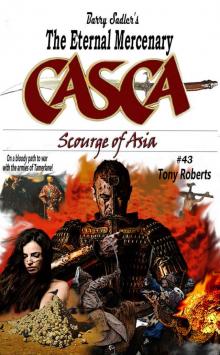 Casca 43: Scourge of Asia
Casca 43: Scourge of Asia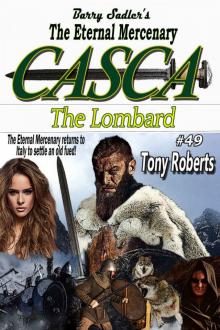 The Lombard
The Lombard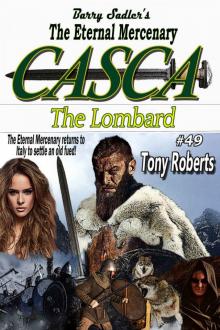 Casca 49: The Lombard
Casca 49: The Lombard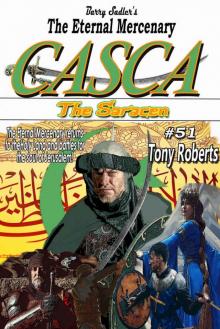 The Saracen
The Saracen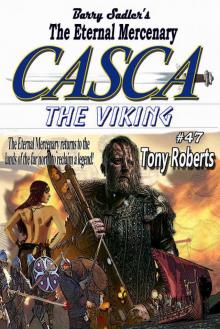 Casca 47: The Viking
Casca 47: The Viking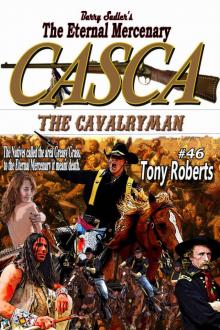 Casca 46: The Cavalryman
Casca 46: The Cavalryman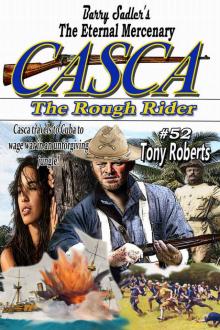 Casca 52- the Rough Rider
Casca 52- the Rough Rider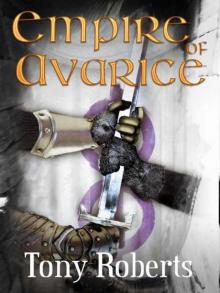 Empire of Avarice
Empire of Avarice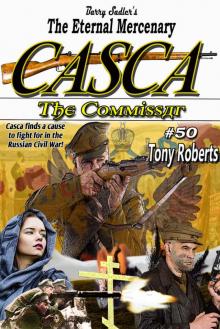 The Commissar
The Commissar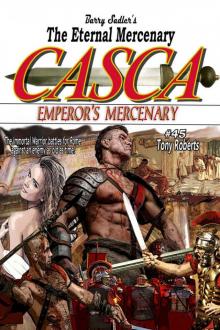 Casca 45: Emperor's Mercenary
Casca 45: Emperor's Mercenary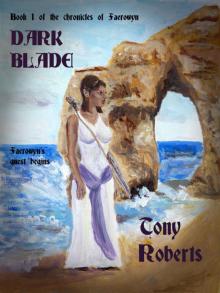 Dark Blade
Dark Blade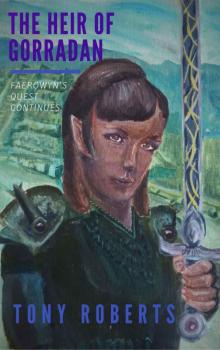 The Heir of Gorradan (Chronicles of Faerowyn Book 2)
The Heir of Gorradan (Chronicles of Faerowyn Book 2)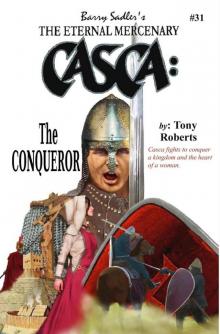 Casca 31: The Conqueror
Casca 31: The Conqueror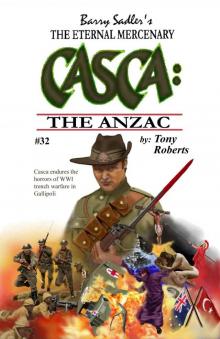 Casca 32: The Anzac
Casca 32: The Anzac The Anzac
The Anzac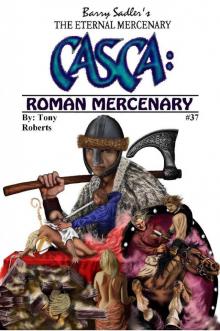 Casca 37: Roman Mercenary
Casca 37: Roman Mercenary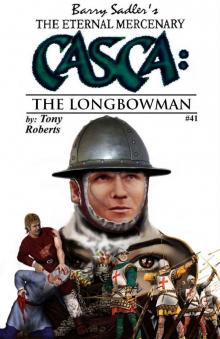 Casca 41: The Longbowman
Casca 41: The Longbowman The Longbowman
The Longbowman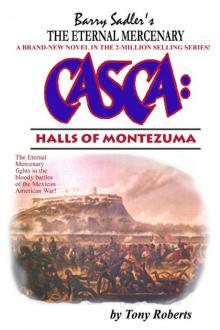 Casca 25: Halls of Montezuma
Casca 25: Halls of Montezuma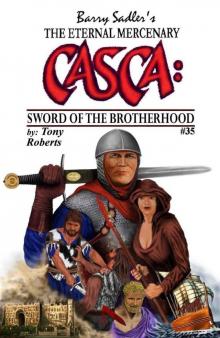 Sword of the Brotherhood
Sword of the Brotherhood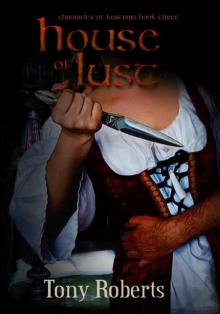 House of Lust
House of Lust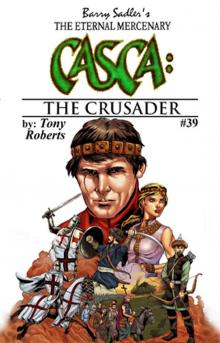 Casca 39 The Crusader
Casca 39 The Crusader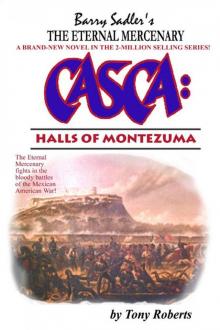 Halls of Montezuma
Halls of Montezuma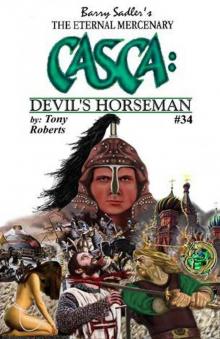 Devil's Horseman
Devil's Horseman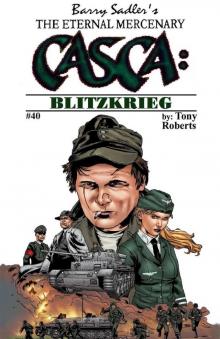 Casca 40: Blitzkrieg
Casca 40: Blitzkrieg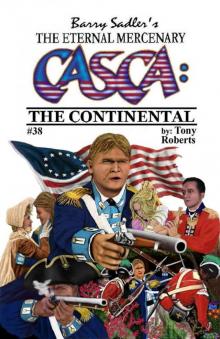 Casca 38: The Continental
Casca 38: The Continental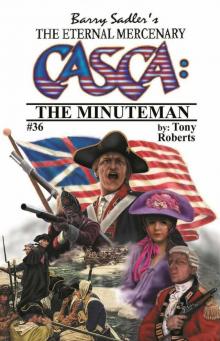 The Minuteman
The Minuteman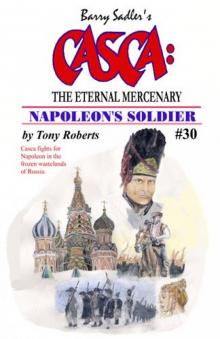 Napoleon's Soldier
Napoleon's Soldier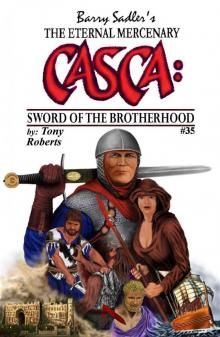 Casca 35: Sword of the Brotherhood
Casca 35: Sword of the Brotherhood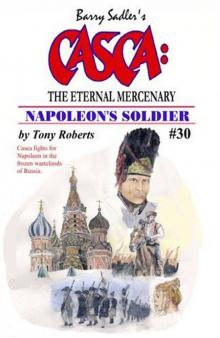 Casca 30: Napoleon's Soldier
Casca 30: Napoleon's Soldier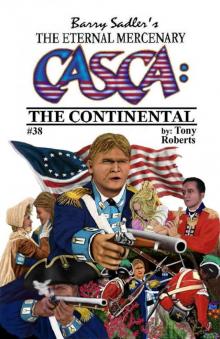 The Continental
The Continental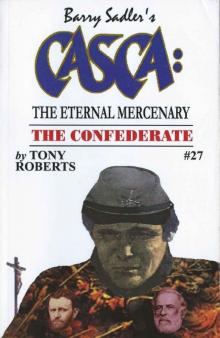 The Confederate
The Confederate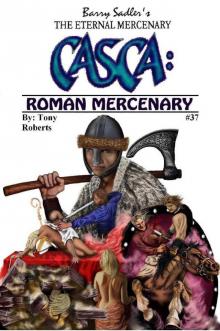 Roman Mercenary
Roman Mercenary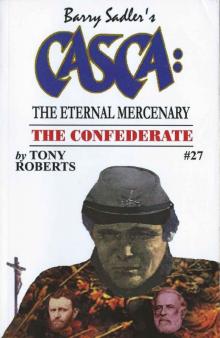 Casca 27: The Confederate
Casca 27: The Confederate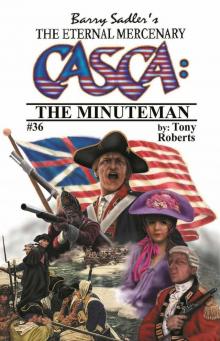 Casca 36: The Minuteman
Casca 36: The Minuteman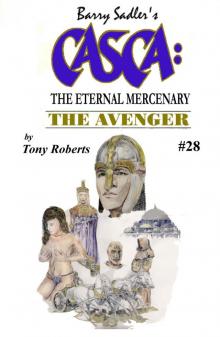 Casca 28: The Avenger
Casca 28: The Avenger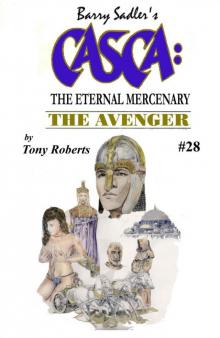 The Avenger
The Avenger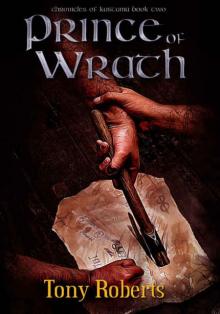 Prince of Wrath
Prince of Wrath